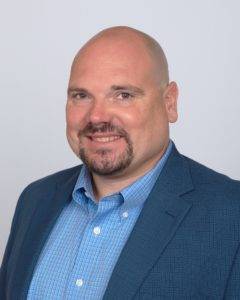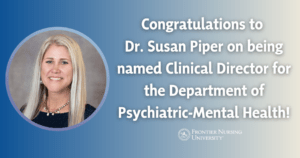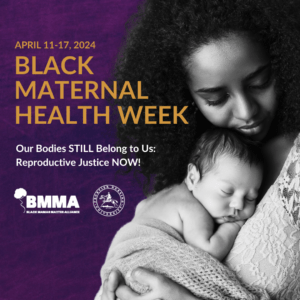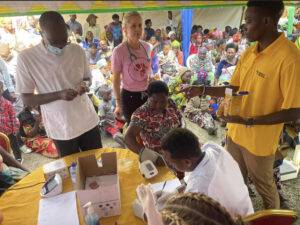Editor’s Note: Dr. Jess Calohan, DNP, is an Associate Professor and Department Chair of FNU’s Psychiatric-Mental Health Nurse Practitioner program. A recent retiree from the United States Army after 20 years of distinguished service, he is a recognized expert in treating combat-related PTSD, presenting nationally and internationally with multiple peer-reviewed publications. He was awarded the prestigious “A” designator by the United States Army Surgeon General in 2013, an honor that is given to less than 5% of Army medical officers in recognition of his expertise and significant contributions to military medicine. He also earned multiple military awards, most notably the Bronze Star and Defense Meritorious Service Medal.
 How has the pandemic impacted mental health in America?
How has the pandemic impacted mental health in America?
The pandemic has actually created a mental health crisis in America. One national behavioral health crisis service has seen an 800% increase in calls and internet inquiries over the past four months. This has truly been a national disaster in which there is really no relief at this point. In my professional practice, I’ve hospitalized more patients in the past nine months than I have in the last four years. People are stressed and those with mental health conditions are vulnerable to symptom exacerbation due to the increased stress. Then we have the family and friends of the more than 300,000 individuals that have died due to COVID struggling with grief as many of them didn’t get to say goodbye to their loved ones. This is an unprecedented time for the mental health of our country and the impact may well last a generation.
How have mental health professionals and their patients adapted to conducting visits during the pandemic?
Mental health care was initially seen as routine care during the beginning of the pandemic with the exception of emergency services. Many patients had appointments canceled due to quarantining and social distancing requirements. Many insurance payers along with Medicaid and Medicare did not reimburse for telephone and other types of virtual visits so care was delayed until late March when Congress passed legislation allowing reimbursement for telephone visits with patients. Other payers began to follow suit and care resumed for many patients. Psychiatry, in general, has been a pioneer in telehealth, however, it was not widely used in many practices. Providers had to quickly learn the nuances of providing telehealth services and incorporate those into clinical practice. At FNU we provide telehealth training and allow our students to use telehealth modalities in their clinical practicums.
Do you think anything that has changed in mental health care during the pandemic will persist after the pandemic is over?
Yes, telehealth utilization prior to the pandemic with our student population was about 10%. That number increased to 70% during the pandemic. I believe telehealth utilization for behavioral health services will likely fall somewhere in between. The bottom line is that it will become part of a behavioral health provider’s daily practice.
What challenges have FNU students faced during the pandemic? Have they had difficulty finding preceptors?
Our students have faced multiple challenges related to the pandemic. The two most common things we have seen are increased workload for students in their jobs and adjusting work/life/school balance. From a clinical perspective, we’ve been able to adjust and have increased the number of telehealth hours so that they can stay engaged in clinical. Our department has not had a significant impact on clinical placements.
What do prospective PMHNP preceptors need to know about precepting FNU students? What is required of them and how do they make themselves available to precept?
Even though our program is relatively new, we are becoming one of the top education PMHNP programs in the country. We are much different than other distance programs in that we require students to have face to face time with faculty. When the pandemic is contained, our students will resume two on-campus requirements that prepare them for the didactic and clinical portions of the program. We currently have successfully adapted these requirements to the virtual environment, but are looking forward to returning to our new campus. We are not a “death by discussion board” program. Part of what makes FNU unique is our ability to develop a sense of community in the virtual environment and our faculty engage students through a variety of technological platforms. Our faculty have diverse backgrounds and clinical experience. All of our faculty still practice including me. We are one of the few programs in the country that have a telehealth simulation clinic so that students can have faculty-supervised simulated patient experiences before moving on to their clinical practicums.
We have dedicated clinical faculty that support preceptors and students during the clinical rotation. The clinical faculty support reduces the administrative burden on preceptors and we offer honorariums for preceptors that precept our students.
Please describe the current and future level of need for mental health practitioners in the U.S.
We have a nationwide shortage of behavioral health providers and 3% of behavioral health providers are providers of color. FNU has a long history of graduating providers to serve in their communities. We also have made a tangible commitment to increasing the diversity of our student population and graduates.





 Dr. Nikia Grayson, DNP, MSN, MPH, MA, CNM, FNP-C, FACNM (she/her) is a trailblazing force in reproductive justice, blending her expertise as a public health activist, anthropologist, and family nurse-midwife to champion the rights and health of underserved communities. Graduating with distinction from Howard University, Nikia holds a bachelor’s degree in communications and a master’s degree in public health. Her academic journey also led her to the University of Memphis, where she earned a master’s in medical anthropology, and the University of Tennessee, where she achieved both a master’s in nursing and a doctorate in nursing practice. Complementing her extensive education, she completed a post-master’s certificate in midwifery at Frontier Nursing University.
Dr. Nikia Grayson, DNP, MSN, MPH, MA, CNM, FNP-C, FACNM (she/her) is a trailblazing force in reproductive justice, blending her expertise as a public health activist, anthropologist, and family nurse-midwife to champion the rights and health of underserved communities. Graduating with distinction from Howard University, Nikia holds a bachelor’s degree in communications and a master’s degree in public health. Her academic journey also led her to the University of Memphis, where she earned a master’s in medical anthropology, and the University of Tennessee, where she achieved both a master’s in nursing and a doctorate in nursing practice. Complementing her extensive education, she completed a post-master’s certificate in midwifery at Frontier Nursing University.









 Dr. Tia Brown McNair is the Vice President in the Office of Diversity, Equity, and Student Success and Executive Director for the Truth, Racial Healing, and Transformation (TRHT) Campus Centers at the American Association of Colleges and Universities (AAC&U) in Washington, DC. She oversees both funded projects and AAC&U’s continuing programs on equity, inclusive excellence, high-impact practices, and student success. McNair directs AAC&U’s Summer Institutes on High-Impact Practices and Student Success, and TRHT Campus Centers and serves as the project director for several AAC&U initiatives, including the development of a TRHT-focused campus climate toolkit. She is the lead author of From Equity Talk to Equity Walk: Expanding Practitioner Knowledge for Racial Justice in Higher Education (January 2020) and Becoming a Student-Ready College: A New Culture of Leadership for Student Success (July 2016 and August 2022 Second edition).
Dr. Tia Brown McNair is the Vice President in the Office of Diversity, Equity, and Student Success and Executive Director for the Truth, Racial Healing, and Transformation (TRHT) Campus Centers at the American Association of Colleges and Universities (AAC&U) in Washington, DC. She oversees both funded projects and AAC&U’s continuing programs on equity, inclusive excellence, high-impact practices, and student success. McNair directs AAC&U’s Summer Institutes on High-Impact Practices and Student Success, and TRHT Campus Centers and serves as the project director for several AAC&U initiatives, including the development of a TRHT-focused campus climate toolkit. She is the lead author of From Equity Talk to Equity Walk: Expanding Practitioner Knowledge for Racial Justice in Higher Education (January 2020) and Becoming a Student-Ready College: A New Culture of Leadership for Student Success (July 2016 and August 2022 Second edition).